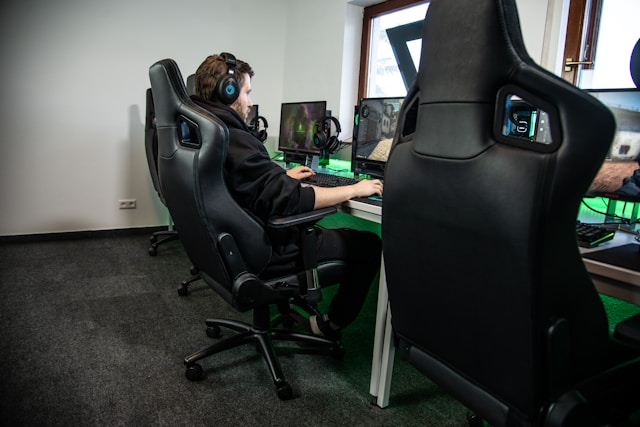Virtual reality (VR) gambling is more than a technological leap—it’s a psychological transformation. Unlike traditional online casinos that rely on flat screens and limited interactions, VR gambling places players inside fully realized digital environments. This sense of presence and immersion isn’t just a novelty; it directly affects how players behave, engage, and even spend money. Understanding the psychological principles behind immersion can help players, developers, and regulators better navigate this emerging form of entertainment.
What Is Immersion in VR Gambling?
Immersion refers to the feeling of being fully enveloped in a virtual environment, often to the point where the player temporarily forgets the physical world. In VR gambling, this can mean:
- Sitting at a virtual poker table surrounded by other avatars
- Pulling the lever of a 3D slot machine in a digital casino
- Hearing realistic background noise like chips clinking or slot bells
- Walking through a luxurious casino floor designed in fantasy or real-world themes
These elements combine to create a powerful sense of “being there,” which is central to emotional and psychological engagement.
The Concept of Presence
At the heart of VR immersion is the idea of presence—the psychological state where players perceive the virtual world as real. In gambling, presence is intensified through:
- First-person perspective, making actions feel natural
- Spatial audio, which provides realistic, directional sound cues
- Haptic feedback, allowing players to “feel” interactions (e.g., card dealing, dice rolling)
- Real-time interactivity, where players can move around, talk, and respond to the environment
Presence transforms passive gambling into active participation, heightening emotional reactions and strengthening the overall experience.
Sensory Design and Emotional Response

VR gambling environments are crafted with multisensory design to manipulate mood and behavior. Developers use visual, auditory, and tactile cues to:
- Create excitement with flashing lights and dynamic environments
- Establish comfort with warm colors, ambient music, and smooth animations
- Encourage focus by eliminating distractions from the physical world
This sensory manipulation plays directly into reward systems in the brain, often increasing the desire to continue playing. The more immersive the environment, the more likely a player is to lose track of time or money.
Social Immersion and Avatars
A major psychological aspect of VR gambling is social immersion. Unlike standard online casinos, VR platforms allow players to:
- Create custom avatars
- Interact with other users at tables or in lounges
- Participate in group games or tournaments
These interactions trigger social behaviors and motivations, such as competitiveness, collaboration, and reputation-building. Being seen by others in a virtual space can also influence risk-taking and decision-making, just as it does in real casinos.
Risk Perception and Spending Behavior
One of the most profound psychological impacts of immersion is its effect on risk perception and spending habits. Studies show that in immersive environments:
- Players often underestimate the value of virtual currency, leading to higher spending
- Time perception is distorted, encouraging longer sessions
- The realism of VR can mimic the “high” of real-world gambling, reinforcing repeat behavior
- Emotional engagement increases impulsivity and lowers resistance to losses
These tendencies make VR gambling potentially more addictive than traditional formats, particularly for vulnerable players.
Cognitive Load and Decision-Making
In VR, players must process more information simultaneously: movement, interaction, visuals, and sounds. This increases cognitive load, which can:
- Reduce a player’s ability to critically analyze bets
- Lead to more impulsive decisions
- Cause fatigue, further weakening decision-making over time
This makes it essential for platforms to design interfaces that are intuitive and not overwhelming, especially for new users.
Personalization and Identity
The ability to customize one’s avatar and surroundings adds another layer of psychological connection. Players form digital identities, which influence how they behave:
- A player with a bold avatar may act more aggressively in games
- Those who invest time in customizing their experience feel more emotionally attached
- Personalization increases brand loyalty and time spent on the platform
This identity investment mirrors behavior seen in online gaming and social media, where digital self-expression plays a major role in engagement.
Ethical Considerations and Responsibility

With great immersion comes greater responsibility. The psychological power of VR can be harnessed for engagement, but also raises concerns:
- Addiction risks are higher due to increased emotional and sensory engagement
- Younger users may be more susceptible to immersive environments
- Informed consent is needed to ensure users understand the potential psychological impact
Operators and regulators must implement features like:
- Time tracking and reminders
- Spending alerts and self-exclusion options
- Transparency about odds and fairness
- Mental health resources and warnings about immersive gameplay
Ethical design will be crucial as VR gambling moves from experimental to mainstream.
The Future of Immersive Gambling
As VR hardware improves and becomes more accessible, we can expect:
- Hyper-realistic casino environments with live interactions
- Cross-platform experiences, where players can seamlessly shift from mobile to VR
- AI-powered NPCs that enhance engagement and simulate real social experiences
- Gamified narratives, where gambling is embedded in storytelling and adventure settings
These trends will push immersion to new levels, making it even more essential to understand the psychological implications of VR gambling.
Final Thoughts
Immersion in VR gambling is not just about technology—it’s about psychology. By creating rich, engaging, and believable environments, VR taps into core human behaviors: the desire for presence, social interaction, reward, and identity. While this creates incredible opportunities for entertainment, it also poses new challenges in terms of responsible play, ethical design, and mental health.
For players and developers alike, understanding the psychology of immersion is key to enjoying and building VR gambling experiences that are both exciting and safe. As the virtual world expands, so too must our awareness of how it shapes the human mind.
